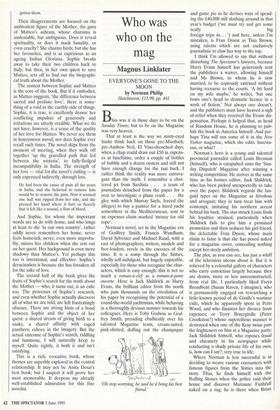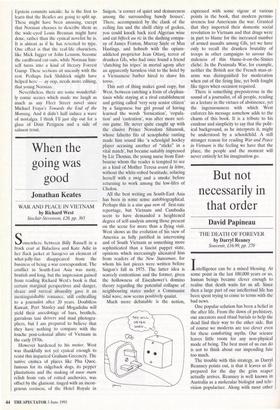Who was who on the mag
Magnus Linklater
EVERYONE'S GONE TO THE MOON by Norman Philip Hutchinson, £15.99, pp. 441 Bliss was it in those days to be on the Sunday Times; but to be on the Magazine was very heaven.
That at least is the way we misty-eyed hacks think back on those pre-Murdoch, pre-Andrew Neil, El Vino-drenched days, when a chap could draw out £50 in expens- es at lunchtime, order a couple of bottles of bubbly and a dozen oysters and still not have enough change for the taxi back. I rather think the reality was more extrava- gant than the myth. I remember a char- tered jet from Sardinia . . . a team of journalists detached from the paper for a year to investigate a plane crash . . . the glee with which Murray Sayle, forced (he alleges) to buy a painter for a hired yacht somewhere in the Mediterranean, sent in an expenses claim marked 'money for old rope'.
Norman's novel, set in the Magazine era of Godfrey Smith, Francis Wyndham, David Sylvester and Michael Rand, with a cast of photographers, writers, models and free-loaders, revels in the excesses of the time. It is a romp through the Sixties, wholly self-indulgent, but hugely enjoyable, especially for those who recognise the char- acters, which is easy enough: this is not so much a roman-a-clef as a roman-ii Porte ouverte. Here is Jack Shildrick as Harry Evans, the brilliant editor from the north who puts thousands on the circulation of his paper by recognising the potential of a round-the-world yachtsman, while behaving in a thoroughly devious manner towards his colleagues. Here is Toby Godwin as God- frey Smith, presiding ebulliently over his talented Magazine team, cream-suited, pink-shirted, dolling out the champagne `Oh stop worrying, he said he'd bring his best friend.' and game pie as he devises ways of spend- ing the £40,000 still sloshing around in that year's budget ('we must try and get some really big foreign trips in. . ') and here, unless I'm mistaken, is Fran Dyson as Tina Brown, using talents which are not exclusively journalistic to claw her way to the top.
I think I'm allowed to say that without disturbing The Spectator's lawyers, because Harry Evans himself has generously sent the publishers a waiver, allowing himself and Ms Brown, to whom he is now married, to be copiously satirised without having recourse to the courts. 'A bit hard on my wife maybe,' he writes, 'but one bows one's head to dramatic licence in a work of fiction.' Not always one doesn't, and the publishers must have heaved a sigh of relief when they received the Evans dis- pensation. Perhaps it helped that, as head of Random House, he is planning to pub- lish the book in America himself. And per- haps Tina will run some of it in the New Yorker magazine, which she edits. Incestu- ous, or what?
Norman's hero is a young and talented provincial journalist called Louis Brennan (himself), who is catapulted onto the 'Sun- day Dispatch' Magazine after winning a writing competition. He arrives at the same time as his former editor, Jack Shildrick, who has been picked unexpectedly to take over the paper. Shildrick regards the lan- guid types on the Magazine as frivolous and arrogant; they in turn treat him with contempt, imitating his northern accent behind his back. The star-struck Louis finds his loyalties strained, particularly when Shildrick fails to give him a promised promotion and then seduces his girl-friend, the delectable Fran Dyson, whose main claim to fame is that she has posed naked for a magazine cover, concealing nothing except her steely ambition.
The plot, as you can see, has just a whiff of the television sitcom about it. But it is relieved by a colourful gallery of characters who carry conviction largely because they are drawn, more or less unreconstructed, from real life. I particularly liked Freya Broadbent (Susan Raven, I imagine), who is permanently engaged on researching a little-known period of de Gaulle's wartime exile, which he apparently spent in Petts Wood, and who finances her divorce from expenses; or Terry Bracegirdle (Peter Crookston?) whose supercilious manner is destroyed when one of the Kray twins puts the frighteners on him at a Magazine party; Jack Shildrick himself, who exposes fraud and chicanery in his newspaper while conducting a shady private life of his own, is, how can I say?, very true to life.
Where Norman is less successful is in deciding to weave various encounters with famous figures from the Sixties into the story. Thus, he finds himself with the Rolling Stones when the police raid their house and discover Marianne Faithfull naked on a rug; he is there when Brian Epstein commits suicide; he is the first to learn that the Beatles are going to split up. These might have been amusing, except that Norman chooses to describe them as the wide-eyed Louis Brennan might have done, rather than the cynical novelist he is. It is almost as if he has reverted to type. One effect is that the real-life characters, like Mick Jagger or John Lennon, become the cardboard cut-outs, while Norman him- self turns into a kind of literary Forrest Gump. These sections sit uneasily with the rest. Perhaps Jack Shildrick might have helped here — ay oop, needs more editing, that young Norman.
Nevertheless, there are some wonderful- ly comic scenes which made me laugh as much as any Fleet Street novel since Michael Frayn's Towards the End of the Morning. And it didn't half induce a wave
of nostalgia. I think just slip out for a glass of Dom Perignon and a side of salmon trout.



































































 Previous page
Previous page